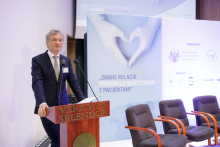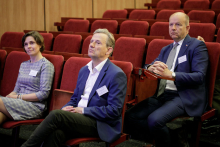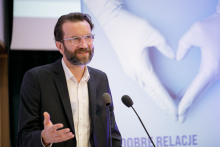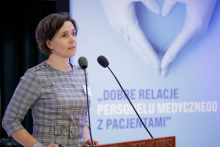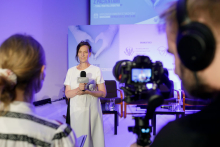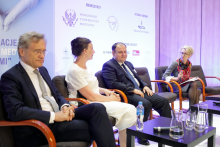The strategy of “good relations between medical staff and patients” was conceived by the Association of the Academy of Medical Communication and the Polish Society of Medical Communication which supervised the work in cooperation with the Medical University of Warsaw. The document was written after many nationwide studies, as part of which both patients and medical staff were interviewed, to get to know different perspectives and identify the most important problems. The very development of these recommendations began with interviews with communication experts. Then there were workshops where specialists were looking for solutions to existing problems. Finally, the initial recommendations were consulted. They were attended by: decision-makers, managers, medical staff, representatives of universities and patients. It is these five groups will be responsible for the implementation of the recommendations of the strategy. Work on the document has been ongoing since October 2020. Finally, there is a catalog of 5 main recommendations with 33 specific, recommended measures. Each measure has been assigned one of three levels of significance and one of three levels of ease of implementation.
Key recommendations
- Communication classes should be mandatory for students of all medical faculties.
- Modification and simplification of information explaining the operation of the system and procedures in order to understand the patient’s perspective and language.
- Explaining the patient’s health condition in a way that is understandable to them and well aligned with their emotional state.
- Conducting a continuous standardized process of monitoring the patients’ experiences with medical facilities.
- Regular analysis of results allowing to take actions to improve relations along with measuring treatment results.
- Developing good relations between members of the therapeutic team and improving cooperation and conflict resolution skills.
- Building good relations between the therapeutic team and support staff (reception, registration, assistants, coordinators, secretaries in offices) so that the patient receives relevant, consistent and understandable information in contacts with various staff members.
- In the course of education teaching methods should be used to develop skills in an environment as close as possible to the actual working conditions of medical personnel.
- Verification of learning outcomes using skills assessment methods and taking into account assessments made by patients.
- Organization of the space of medical facilities (including offices) so that it is friendly and comprehensible for the patient.
These recommendations are thought to be moderately difficult and difficult to implement. The strategy also includes recommendations that are relatively easy to implement. It is worth mentioning them because they can help improve communication with a small expenditure of energy and resources.
Recommendations easiest to follow
- The list of learning outcomes in the standards of education should describe in detail the communication skills with both the patient and colleagues, which will enable the standardization of education programs.
- The content of the education should take into account recommendations of Polish and international scientific societies dealing with medical communication.
- Educational hours for medical staff. During the working hours of medical personnel time for improving their competences should be taken into account.
- Medical staff should be able to participate free of charge in training sessions improving their competences in the field of building good relations.
- Implementation of an educational campaign emphasizing the importance of involving patients and their relatives in the therapeutic process.
- Activities aimed at improving the health competences of the society.
- Writing comprehensible guides for patients and their relatives, informing about research, disease, treatment, etc. based on Evidence Based Medicine.
- Improving awareness of the patient’s rights and obligations.
- Organization of events aimed at promoting research and good practices in the field of relationship building and medical communication, such as, for example, conferences or workshops.
- Education on the principles of functioning of the health care system.
The strategy of “good relations between medical staff and patients” was presented during the conference on communication in medicine and good relations with patients, which was held at the Medical University of Warsaw. Below is a photo report from the event.

